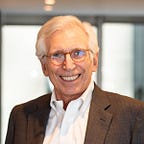A Debate Closer for the Ages?
On August 8, it will be 45 years since Richard Nixon resigned the presidency, driven from office by the cumulative corruption known as Watergate. Only two years before, Nixon had won re-election with 520 electoral votes, carrying 49 states.
In 1976, the former governor of Georgia, James Earl Carter was elected President. In December 1974, when he announced his candidacy, the headline in the state’s largest newspaper was: “Jimmy Who Is Running For What!?”
The relevant political axiom is “A week is a long time in politics…”
So, it is now 15 months before the 2020 election, and we are reading hourly about miniscule developments in the wide-open Democratic race and Donald Trump’s incessant self-congratulatory and/or splenetic Tweets.
Joining an audience of millions of Americans on successive summer nights, I watched this round of Democratic debates, hosted by CNN. Unless something completely unexpected happens, one of the 20 contenders will be facing Trump and his apparently ardent constituents, including virtually all the GOP officeholders. CNN’s over-the-top entertainment gloss on this ostensibly solemn ritual has been criticized as in keeping with the greater trivialization of our politics. The issues are serious, but the process is raucous. The main currency of success is money raised.
To be fair, debates as entertainment are not really new. The Lincoln-Douglas debates, 150 years ago, were a popular hit in their day. (You can watch them reenacted on C-SPAN).
Andrew Yang, an entrepreneur whose radicalism as a candidate includes not wearing a tie, observed in one of his interjections that all the would-be presidents were wearing makeup. Perspiration is a major infraction. And I heard them all reciting what were clearly memorized remarks at the start and close, while devising the occasional zinger about an opponent to hopefully become a viral soundbite.
I suspect I was not the only person watching for almost six hours who was uninspired by this spectacle. So, on the elliptical the morning after round two, I composed a closing speech I’d like to hear. Feel free to send it along to the candidates.
Thank You.
I would not claim to be John Kennedy, who, had he lived, I contend might have been a great president.
But if I am elected, I would strive to be Lyndon Johnson without Vietnam; Jimmy Carter without Iran; Bill Clinton without Monica Lewinsky and Barack Obama without Mitch McConnell. All these presidents pursued objectives, overall, that reflect the kind of country I believe a majority of Americans would like to have.
No one can guarantee that that there would not be similar crises and obstacles as those faced by my modern Democratic predecessors. But knowing what has happened in the past may help guide me in the future.
Elections are about personalities — that is increasingly the case in today’s world. Yet it is policies that ultimately matter most. There is much to discuss in what other contenders have said. Their goals are unanimous: national security in a globally dependent system; health care that is universally affordable and accessible and the same standard for education from pre-school through college.
The presidency is a uniquely powerful institution, not just for what it can do, but for what it represents in the continuity of American history and the inevitable challenges we face.
